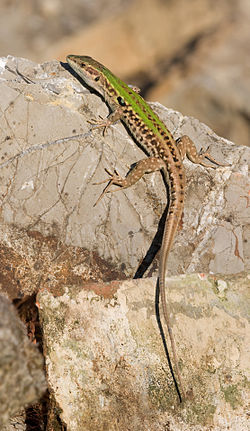Talk:Italian wall lizard
A fact from Italian wall lizard appeared on Wikipedia's Main Page in the Did you know column on 8 June 2008, and was viewed approximately 3,920 times (disclaimer) (check views). The text of the entry was as follows:
|
| This article is rated C-class on Wikipedia's content assessment scale. It is of interest to the following WikiProjects: | |||||||||||
| |||||||||||
Evolution
[edit]I think we should incorporate the information contained in this link.
[| Lizards Rapidly Evolve After Introduction to Island] —Preceding unsigned comment added by Cmanser (talk • contribs) 21:45, 22 April 2008 (UTC)
Rapid Evolution vs. Lamarckism
[edit]Deserves mention I should think. Lycurgus (talk) 10:47, 8 June 2008 (UTC)
File:Podarcis sicula rb edit.jpg to appear as POTD soon
[edit]Hello! This is a note to let the editors of this article know that File:Podarcis sicula rb edit.jpg will be appearing as picture of the day on August 26, 2012. You can view and edit the POTD blurb at Template:POTD/2012-08-26. If this article needs any attention or maintenance, it would be preferable if that could be done before its appearance on the Main Page so Wikipedia doesn't look bad. :) Thanks! —howcheng {chat} 17:06, 24 August 2012 (UTC)
External links modified
[edit]Hello fellow Wikipedians,
I have just modified one external link on Italian wall lizard. Please take a moment to review my edit. If you have any questions, or need the bot to ignore the links, or the page altogether, please visit this simple FaQ for additional information. I made the following changes:
- Added archive https://www.webcitation.org/6158nVcVS?url=http://newswise.com/articles/view/539909/ to http://newswise.com/articles/view/539909/
When you have finished reviewing my changes, you may follow the instructions on the template below to fix any issues with the URLs.
This message was posted before February 2018. After February 2018, "External links modified" talk page sections are no longer generated or monitored by InternetArchiveBot. No special action is required regarding these talk page notices, other than regular verification using the archive tool instructions below. Editors have permission to delete these "External links modified" talk page sections if they want to de-clutter talk pages, but see the RfC before doing mass systematic removals. This message is updated dynamically through the template {{source check}} (last update: 5 June 2024).
- If you have discovered URLs which were erroneously considered dead by the bot, you can report them with this tool.
- If you found an error with any archives or the URLs themselves, you can fix them with this tool.
Cheers.—InternetArchiveBot (Report bug) 01:00, 18 November 2017 (UTC)
Possible new subsections
[edit]Hi there, I really enjoyed the explanation of the study done that showed rapid evolution of the Mrcaru lizards. Well done! I'd like to suggest adding a category about mating, diet, and perhaps consolidating the information already present about the lizard's habitats and where it has been introduced into one category under habitat and distribution. I believe a map would also help with clarity. Overall, well-written and easy to understand. Vportugal (talk) 19:02, 23 September 2021 (UTC)Vportugal
New Sections Added
[edit]Hi all! I have made some significant additions to this article while leaving the original writing intact (for the most part). Additions include a description and ecology section. I also added lots of info about behavior. These additions were made for a class assignment. I appreciate any feedback! Thanks so much.Tulipsareverypretty (talk) 19:00, 31 October 2021 (UTC)
On this page, I mainly altered the headings to make the flow of the entry more clear. For instance, I changed the section initially titled “Description” to now be titled “Physical Description” as it better encompassed the details listed in the paragraph beneath this heading. Again, as the entire Wikipedia page is a holistic description of the Italian wall lizard, I corrected the heading to “Physical Description” to make it more specific. In addition, I deleted the word “Behavior” from the heading that was originally titled “Feeding Behavior” because it was a subsection under the general “Behavior” heading. Thus, it was unnecessarily repetitive and could be removed. Going along with this, I deleted a few other repetitive words for the sake of clarity and enhanced a couple instances grammar-wise. Generally speaking, I really appreciated the organization of this entry! Ritu27 (talk) 23:17, 18 November 2021 (UTC)
Hello. For a class assignment I added a sentence and in-text link to the Habitat section as follows: It is able to live in such open habitats due to biological characteristics, such as high thermophily, which is the ability to thrive in high temperatures. I also added other in-text links to provide more explanation and context for biology-related terms such as for thermopile, diel behaviors, generalist, and gravid. Vportugal (talk) 04:28, 19 November 2021 (UTC)
In this article, I added two sentences to the lead section about the lizard's physical description and reproduction behavior since it seems to be important information. I also deleted some usages of words such as however, found, interestingly, despite, and observed since they are suggested not to be used in the good article status guidelines. This was in effort to improve the article and appreciate any feedback. Vportugal (talk) 18:37, 9 December 2021 (UTC)


